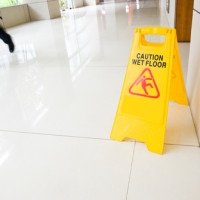Judge Rules Plaintiff’s Slip and Fall Case is Really a Medical Malpractice Claim and Dismisses Lawsuit

If a patient at a clinic slips and falls in the bathroom after a medical procedure, is the case against the clinic one of ordinary negligence or professional negligence (medical malpractice)? A New Jersey court recently held that such a situation was a matter of professional negligence and dismissed the case because the injured plaintiff had not completed the extra procedures required to file a medical malpractice lawsuit. The appeals court affirmed last month in the case of Finley v. Shin.
Failure to evaluate or supervise patient was potentially medical negligence
The plaintiff in this case had just undergone a routine cystoscopy at the defendant’s office. The patient asked the doctor if he could use the bathroom in the examination room, and the doctor said okay, determining that the patient was stable enough to get from the examination table to the restroom. While alone in the bathroom, the patient fell and suffered head and neck injuries.
The patient and his wife sued the doctor and his medical practice for negligence, claiming that the defendants were negligent in not supervising the patient after his procedure sufficiently, and by not having a call button or pull string in the bathroom that could be used to alert staff if a patient in the restroom is having difficulty. The plaintiff even submitted a report of an architect who gave his expert opinion that the clinic deviated from the required professional standards of care for medical facilities.
Affidavit of Merit required to pursue case of medical malpractice
Since the court decided the case was one of professional negligence, the plaintiff was required to submit an Affidavit of Merit (AOM). An AOM is required in medical malpractice cases; it is a sworn statement by a qualified medical expert in the same field as the defendant who has reviewed the case and believes the case has merit, or that there is a reasonable probability that the doctor’s conduct fell outside the acceptable standards or practices. An AOM must be filed within 60 days of the defendant’s answer to the plaintiff’s petition, and failure to file the AOM is a failure to state a cause of action. Since the plaintiff did not file an AOM in this case, the judge dismissed the complaint.
An exception to the AOM requirement does exist where the jury could evaluate the circumstances using their common knowledge and an expert opinion is not required. The judge here decided the jury could not use its common knowledge to determine whether the medical staff should have monitored the patient while he was in the bathroom.

